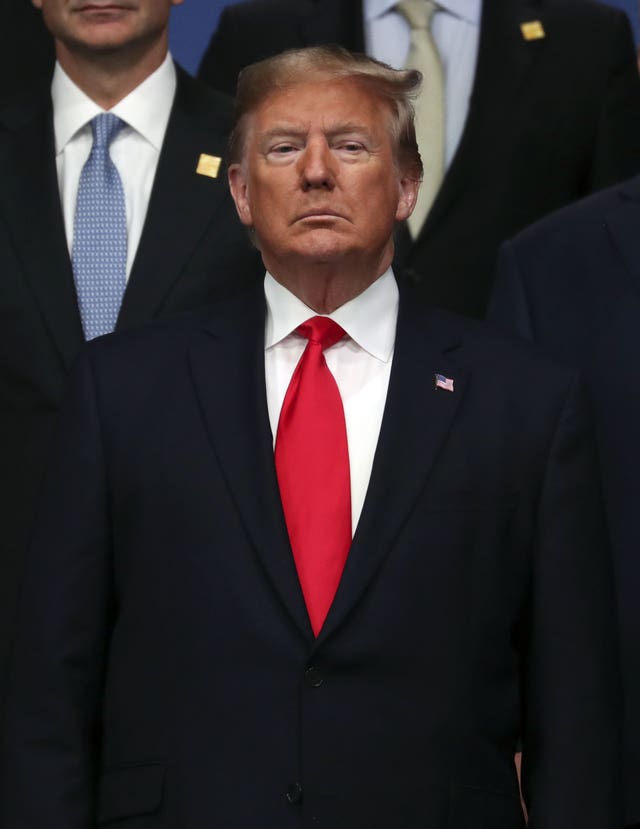Silenced Trump looks for new online megaphone
Bans on the president by Twitter and Facebook have opened discussion on the future of social media platforms.

Deprived of his major online megaphones, Donald Trump is seeking alternative ways to spread his messages in his last days in the White House.
After Twitter, Facebook and Instagram shut the president off for inciting rebellion in the aftermath of the Washington riot, Mr Trump’s main options appear to have much smaller reach.
Chief among them is the far right-friendly Parler — though Google and Apple have both removed it from their app stores and Amazon decided to boot it off its web hosting service.
Mr Trump may launch his own platform. But that will not happen overnight, and free speech experts anticipate growing pressure on all social media platforms to curb incendiary speech as Americans take stock of Wednesday’s violent takeover of the US Capitol by a Trump-incited mob.
Twitter ended Mr Trump’s nearly 12-year run on Friday. In shutting his account it cited a tweet to his 89 million followers that he planned to skip President-elect Joe Biden’s January 20 inauguration that it said gave rioters license to converge on Washington once again.
Twitter also banned Trump loyalists including former national security advisor Michael Flynn in a sweeping purge of accounts promoting the QAnon conspiracy theory and the Capitol insurrection. Some had hundreds of thousands of followers.
In a statement on Friday, Trump said: “We have been negotiating with various other sites, and will have a big announcement soon, while we also look at the possibilities of building out our own platform in the near future.”
The “immense power that the social media platforms have as gatekeepers of public discourse” had been flexed as never before — a power that should be troubling even for supporters of the Trump ban, tweeted Jameel Jaffer, director of the Knight First Amendment Institute at Columbia University.

Apple followed suit on Saturday evening after giving Parler 24 hours to address complaints it was being used to “plan and facilitate yet further illegal and dangerous activities”. Public safety issues will need to be resolved before it is restored, Apple said.
Amazon struck another blow on Saturday, informing Parler it would need to look for a new web-hosting service effective midnight Sunday. It reminded Parler in a letter that it had informed it in the past few weeks of 98 examples of posts “that clearly encourage and incite violence” and said the platform “poses a very real risk to public safety.”
Parler CEO John Matze complained on his site of being scapegoated.
“Standards not applied to Twitter, Facebook or even Apple themselves, apply to Parler,” he said, adding he would not “cave to politically motivated companies and those authoritarians who hate free speech”.
Losing access to the app stores of Google and Apple — whose operating systems power hundreds of millions of smartphones — severely limits Parler’s reach, though it will continue to be accessible via web browser.
Another potential landing spot for Mr Trump is Gab — though both Google and Apple removed it from their app stores in 2017.
Online speech experts expect social media companies led by Facebook, Twitter and Google’s YouTube to more vigorously police hate speech and incitement in the wake of the Capitol rebellion, as Western democracies led by Nazism-haunted Germany already do.
Mr Kaye rejects arguments by US conservatives including the president’s former UN ambassador, Nikki Haley, that the Trump ban savaged the First Amendment, which prohibits the government from restricting free expression.
“Silencing people, not to mention the President of the US, is what happens in China not our country,” Ms Haley tweeted.
But Mr Kate countered: “It’s not like the platforms’ rules are draconian. People don’t get caught in violations unless they do something clearly against the rules.”
While initially arguing their need to be neutral on speech, Twitter and Facebook gradually yielded to public pressure, drawing a line especially when the so-called Plandemic video emerged early in the Covid-19 pandemic urging people not to wear masks, noted civic media professor Ethan Zuckerman of the University of Massachusetts-Amherst.

“Trump will pull a lot of audience wherever he goes,” he said. That could mean more platforms with smaller, more ideologically isolated audiences.
A splintering could push people towards extremes — or make extremism less infectious, he said. Perhaps people looking for a video about welding on YouTube will no longer find themselves being offered an unrelated QAnon video. Alternative media systems that are less top-down managed and more self-governing could also emerge.
Mr Zuckerman also expects major debate about online speech regulation, including in Congress.
“I suspect you will see efforts from the right arguing that there shouldn’t be regulations on acceptable speech,” he said. “I think you will see arguments from the democratic side that speech is a public health issue.”





